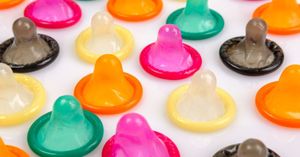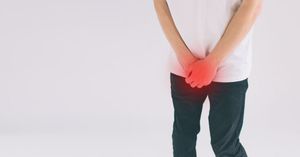Maintaining proper hygiene is crucial for good health, particularly regarding the genitals. Smegma is common among uncircumcised men and can cause unpleasant odor, irritation, and infection. Therefore, cleaning the penis regularly is crucial to prevent smegma buildup and promote good genital health. In this article, we will provide you with simple and effective tips on how to clean penis and also get rid of smegma instantly. Following these tips can maintain good genital hygiene and prevent potential complications.

What is Smegma?
Smegma refers to the buildup of a whitish, cheese-like substance that can accumulate under the foreskin of the penis. It is a mixture of dead skin cells, oils, and other bodily secretions that can have a strong odor and cause discomfort or irritation. While smegma is a natural substance and is not harmful in small amounts, it can lead to bacterial growth and potential health issues if not properly cleaned.

How to Get Rid of Smegma in Males
Maintaining good hygiene practices is the key to preventing the buildup of smegma in males. For uncircumcised males, this means pulling back the foreskin regularly and thoroughly cleaning the head of the penis and surrounding area with warm water and mild soap. It's important to avoid using harsh soaps or cleansers, as these can cause irritation or dry out the skin.
When cleaning the penis, it's important to take your time and be gentle to avoid causing further irritation or discomfort. Use your fingers to gently remove any smegma that has accumulated under the foreskin, and rinse the area thoroughly with warm water. Pat the area dry with a clean towel or cloth, being careful not to rub too vigorously.
To prevent the buildup of smegma, it's important to make good hygiene practices a part of your daily routine. This means regularly cleaning the penis and surrounding area, especially after exercise or sexual activity. If you experience any pain, swelling, or discharge while cleaning your penis or notice any changes in color, texture, or odor, it's important to consult a healthcare professional.
Also Read:How to Give A Penis Massage: A Medically Approved Guide for All Men

How to Clean Penis Properly - Step by Step Guide
Keep reading for tips on how to clean penis and keep things fresh down there.
1. Use a Mild Soap
Even if you don't have a foreskin, you should use soap that won't irritate your penis. Choose a gentle, fragrance-free soap or body wash. Consult your doctor or dermatologist about selecting soap that is gentle on your skin. Swash Intimate wash by Man Matters can also be used for this purpose.
2. Take a Shower
Again, selecting a water temperature that will not scald or irritate your skin is critical. Aim for warm (but not hot) water and wash your entire body with soap as usual.

3. Wash the Penis
Lather your hands with a mild, unscented soap. Apply it to the testicles, the base and shaft of the penis, and the area under the penis's head. Even if you don't have a foreskin, it's important to wash under the head of the penis because sweat, bacteria, and debris can accumulate there. In the absence of the foreskin, simply lather the penis and thoroughly rinse away the soap in the shower or bathtub. After showering or bathing, thoroughly dry the penis. Although applying talc or body powder without the foreskin is technically safe, you should still exercise caution to avoid getting talc in the urethra or causing skin irritations.

How to Clean Penis After Sex?
Cleaning your penis after sex is important to maintaining good genital hygiene and preventing infections. Here are the steps you can take to clean your penis after sexual activity properly:
1. Urinate
It is important to urinate after sex to help flush out bacteria that may have entered the urethra.
2. Wash Your Hands
Before cleaning your penis, wash your hands thoroughly with soap and warm water to avoid introducing additional bacteria.
3. Use Warm Water
The head of your penis and surrounding areas should be rinsed with warm water. You should avoid using hot water, as it can cause skin irritation or dryness.

4. Use Mild Soap
If you must use soap, select a mild, fragrance-free variety that is gentle on the skin. Before applying the soap to your penis, lather your hands.
5. Be Gentle
When cleaning your penis, use gentle pressure and avoid scrubbing too hard, as this can cause irritation or discomfort. Rinse thoroughly with warm water to remove any soap residue.

6. Pat Dry
Pat the area dry with a clean towel or cloth after cleaning your penis. Avoid rubbing too vigorously, as this can aggravate the skin.
You can help keep your penis clean and free of infection after sexual activity by following these simple steps. If you experience any pain, swelling, or discharge while cleaning your penis or notice any changes in color, texture, or odor, you should seek medical attention.

How Do You Clean the Foreskin?
Cleaning the foreskin is an important aspect of male genital hygiene, particularly for those without circumcision. Failure to clean the area can result in the accumulation of smegma, which can cause various complications such as infections, unpleasant odors, and irritation. To clean the foreskin, one should wash their hands with soap and water and gently retract the foreskin to expose the head of the penis. Using warm water and mild soap, the area around the head of the penis and foreskin should be cleaned thoroughly, and the area should be rinsed and dried gently with a clean towel. Regular cleaning of the foreskin is crucial to maintain good genital hygiene and preventing complications. In case of any unusual symptoms or discomfort, it is recommended to seek medical attention from a healthcare professional.

How to Clean Underneath Foreskin?
Cleaning beneath the foreskin is an essential component of male genital hygiene. It aids in the prevention of smegma, a buildup of dead skin cells, oils, and other bodily fluids that, if not removed on a regular basis, can cause infection and inflammation. Here are some steps on how to clean underneath foreskin:
- Wash your hands thoroughly with soap and water before touching your penis.
- Gently pull back the foreskin to expose the glans (head) of the penis.
- Rinse the area with warm water and mild soap, being careful not to use harsh soaps or scrub too hard.
- Use your fingers to remove any smegma or other debris that has accumulated gently.
- Rinse the area again with warm water to ensure all debris has been removed.
- Gently pat the area dry with a clean towel.
Cleaning beneath the foreskin at least once a day is essential for maintaining good genital hygiene. If you have any discomfort, pain, or swelling or notice any unusual discharge, you should see a healthcare professional for further evaluation and treatment.

What Happens if You Don't Clean Your Penis?
If you don't clean your penis regularly, you may experience unpleasant symptoms such as odor, irritation, and infections, including bacterial or fungal infections. Poor hygiene can also lead to the buildup of smegma, a combination of dead skin cells, oils, and other bodily fluids, which can cause discomfort and increase the risk of infection. It's important to clean your penis regularly with gentle soap and warm water to maintain good genital hygiene and prevent potential health issues.

How to Clean Uncircumcised Penis?
Here are 5 different tips on how to clean uncircumcised penis. Read on.
1. Choose a Mild Soap
Many soaps contain perfumes that can irritate sensitive skin, and some contain cleaning agents that are too harsh for genital use. Choose a mild, unscented soap designed for use on the body for the best results (in other words, do not choose hand soap). If you have sensitive skin, consult your doctor or dermatologist about the best soap for you.

2. Take a Shower or Bath
To avoid burning or to irritate your genitals and the rest of your body, use warm water rather than hot water. Shower as usual, and lather with warm water and the mild, unscented soap you choose.
3. Wash the Penis
Lather your hands with your preferred mild, unscented soap and apply it to the testicles and shaft of the penis. The most important thing to remember when dealing with an uncircumcised penis is to wash beneath the foreskin.
- Pull the foreskin as far back as it will go. Forcing the foreskin past its natural point may cause damage to the penis and scar tissue formation.
- Apply soap to the foreskin and thoroughly rinse away any accumulated soap and debris.
- Return the foreskin to its original position.

4. Keep it Clean
Although personal hygiene is important, doctors advise against over-washing the penis. Too much washing, especially with soap or shower gel, can cause soreness and irritation. After showering, make sure to dry the penis thoroughly. Resist the urge to powder your penis if you use talc or body powder on your testicles. Talc can cause irritation and discomfort if it gets under the foreskin.
5. Understand Foreskin Care
An uncircumcised penis pose no significant health risks with proper care and hygiene; however, failure to clean under the foreskin can cause a buildup of oils and debris known as "smegma." Other common foreskin issues are:
- Inflammation is caused by forced retraction and irritants such as harsh or perfumed soap.
- Infections like posthitis and balanitis are commonly caused by poor hygiene and unwashed smegma buildup.

How Can Man Matters Help You in Maintaining Intimate Hygiene?
SWASH intimate wash for men by Man Matters is a carefully formulated product for intimate hygiene. It is the best soap for men's private parts, including the penis, under the foreskin, and groin areas. SWASH intimate wash contains aloe vera, olive oil, tea tree oil, and chamomile. These ingredients gently hydrate the skin and relieve inflammation and redness from the genital area.
It balances dryness and freshness in the intimate area. It is an anti-odor, anti-bacterial, and anti-itch formula free from parabens. It maintains the pH so that the skin is not prone to infection. It also kills harmful bacteria, prevents jock itch, and keeps men’s intimate areas fresh and clean all day.
The intimate wash is used when bathing. It is also travel-friendly. Follow the following steps to use SWASH intimate wash:
- Take a few daps of the foam onto the palms
- Apply on the intimate area gently
- Leave it for 30 to 35 seconds
- Rinse it off

General Tips on How to Wash Penis
Sources suggest some additional tips on how to wash penis and keep it clean down there:
1. Trim Your Pubic Hair Regularly
Hair grows in the pubic region for a reason; you don't need to remove it all. Bacteria that cause infections to love to eat sweat, skin cells, and sebum that has accumulated in the hair shaft. Trim the area rather than shaving it to avoid infection. Shaving in this area usually results in razor burns and itching.
2. Washing Penis After Sex
Cleaning up after sex and masturbation is always a good idea. You should wash your hands after sex because your penis will be covered in bodily fluids. Bacteria flourish in these fluids, particularly after drying. Instead of wiping yourself with a tissue, use warm water and soap to keep yourself clean and infection-free.
Also Read: Should We Drink Water Just After Sex? ~ Answered by a Sexologist

3. Avoid Underwear While Sleeping
It is best to avoid sleeping in your underwear. This is because wearing underwear causes your penis and testicles to rub against your body and clothes, causing you to sweat. Avoiding wearing underwear while sleeping can help dry perspiration and prevent infection by allowing it to dry out.
Tips for Prevention of Smegma
Smegma can be avoided by practicing good personal hygiene. Keep your genitals clean daily and avoid using harsh soaps or products in the area. Consult your doctor if you consistently have excess smegma accumulation despite good personal hygiene or if you notice other changes in your genitals, such as inflammation and pain.

Conclusion on How to Take Care of Penis & Men's Intimate Hygiene
In conclusion, proper hygiene and regular cleaning of the penis are essential to maintaining good genital health and preventing smegma buildup. It is important to avoid using harsh soaps or scrubbing too hard, as this can cause irritation and discomfort. Following the simple steps outlined in the article, such as washing hands with soap and water, retracting the foreskin, using mild soap and warm water to clean the area, and rinsing and drying gently with a clean towel, can help prevent complications and promote healthy genital hygiene.
In cases of persistent or unusual symptoms, seeking medical advice from a healthcare professional for proper diagnosis and treatment is recommended. By maintaining good genital hygiene, men can reduce the risk of unpleasant odor, irritation, and infection and ensure overall good health and well-being.

FAQs
How to Clean Penis Hair?
Cleaning penis hair is an important aspect of personal hygiene, and it can be done by following these steps: First, trim any excess hair using scissors or clippers. Next, gently wash the hair and surrounding area with warm water and mild soap, being careful not to scrub too hard or irritate the skin. Rinse thoroughly and pat dry with a clean towel. It's important to avoid using harsh products or methods, such as hair removal creams or waxing, which can cause irritation or injury to the delicate skin in this area.
Should Men Clean Their Foreskin?
Yes, men with foreskin should clean it regularly as a part of their genital hygiene routine. Foreskin can trap dirt, dead skin cells, and bacteria, leading to unpleasant odors and an increased risk of infections. Proper cleaning of the foreskin involves gently retracting it and washing with warm water and mild soap, being careful not to cause irritation or injury to the delicate skin.
When Should I Clean Under My Foreskin?
You should clean under your foreskin regularly as a part of your genital hygiene routine. It's important to clean your foreskin every day during your shower or bath, and after any activities that cause sweating or buildup of bodily fluids, such as sexual activity or exercise. You should gently retract the foreskin and wash the area with warm water and mild soap, being careful not to scrub too hard or cause irritation.
Should I Clean My Foreskin After Peeing?
While it's not necessary to clean your foreskin after every time you urinate, you should clean it regularly as a part of your genital hygiene routine. Urine is generally sterile but can mix with sweat and other bodily fluids, leading to bacteria and odor buildup. If you notice any buildup or discharge around the foreskin after urinating, cleaning the area with warm water and mild soap is a good idea.
Can I Use Salt Water to Wash My Private Part?
It is generally not recommended to use salt water to wash your private parts. Salt water can be very harsh and may cause irritation and dryness to the sensitive skin in this area. It's better to use mild soap and warm water to clean the genital area gently. Harsh or abrasive products, including salt water, can disrupt the natural balance of bacteria and increase the risk of infection.
References
Sexually Transmitted Infections (STIs) - https://familydoctor.org/condition/sexually-transmitted-infections-stis/
Foreskin care - https://www.betterhealth.vic.gov.au/health/conditionsandtreatments/foreskin-care
Talcum Powder and Cancer - https://www.cancer.org/healthy/cancer-causes/chemicals/talcum-powder-and-cancer.html













